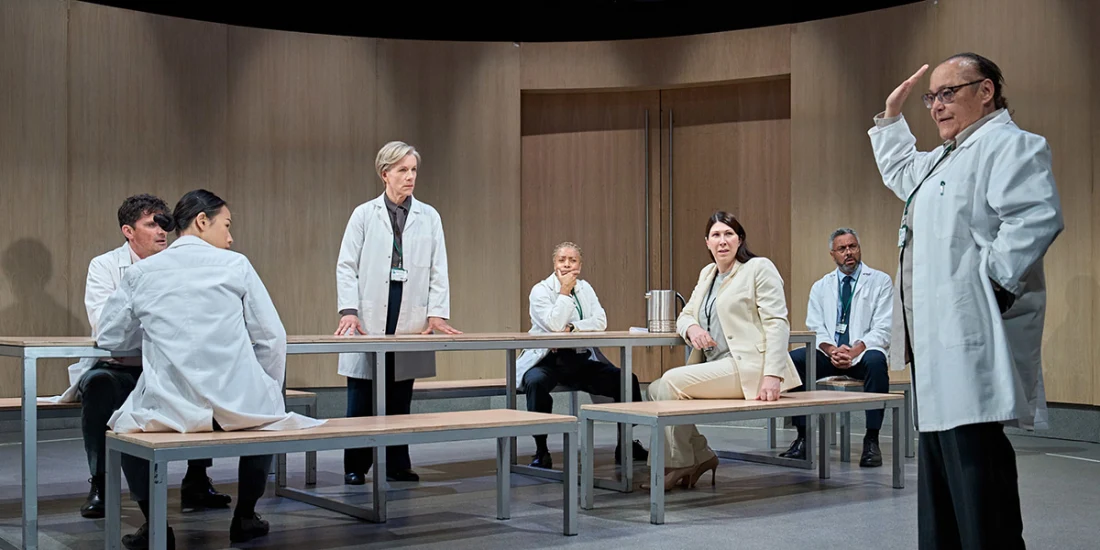'The Doctor' review — a battle between science and religion in Robert Icke's urgent morality play
“No human is an island. We don’t drive change alone,” says a televised debate moderator in The Doctor. But for Professor Ruth Wolff, the subject of said debate, what instigates change? Can medicine be the basis for all rational thoughts, or does identity politics intersect into big decision making?
At the start of The Doctor, Wolff rationalises denying a 14-year-old who self-administered her own abortion the ability to have her last rites as a Father is not permitted in the room. The case initially sends shockwaves in the medical community, but quickly transpires into a national medical ethics dilemma: a 50,000-strong petition demands her appearance on TV debates, she eventually resigns from her position, and becomes physical. By the end, the central case is overshadowed by wider debates about religion, ethnicity, and personal morals, but for Wolff, it all relays back to the one moment she said no.
Robert Icke adapts Arthur Schnitzler’s 1912 play, Professor Bernhardi, into The Doctor. Elements of the original text remain — Ruth Wolff is a Jewish physician, and the patient dies of sepsis. But Professor Bernhardi’s identity politics overhaul transforms The Doctor into an urgent and provocative piece of theatre that taps into the sociopolitical zeitgeist.
Icke taps into our unconscious bias from the get-go. As characters reveal their ethnicity or gender through words, we’re left to build the characters through language, rather than at face value. In doing so, it takes away potential predictability, and we learn of events at the same time as Ruth Wolff. As she begins to understands how her ideas affect others, you almost watch the character’s brain snap into action, and it’s compelling viewing. Three hours fly by in a matter of minutes.
Juliet Stevenson gives a masterful performance as Professor Ruth Wolff, timing every disdainful look and eyebrow raise to perfection. She starts out as a callous doctor with a penchant for correct grammar and a booming voice to a fragile, vulnerable woman who loses everything that forms her identity. You see her tears. You feel her heartache. As she frantically runs around the bare stage, you cry for someone to help her break her surroundings and the walls she built for herself. For Stevenson to do this eight times a week is seriously impressive.
You’d be forgiven for thinking Ruth Wolff’s case in The Doctor is similar to that of the witch hunts in The Crucible, coincidentally playing at the National Theatre. For Wolff, “doctors are witches in white,” — a label to be feared and an easy scapegoat if things go wrong. As she’s forced into the spotlight in a televised debate (Stevenson sits with her back to the audience and we see her on camera throughout this section), Wolff must defend herself in a medical witchhunt where there’s no way out. She must wake up to “wokeness”, or else she’s on the stakes.
But for one doctor to shine, it takes an exceptional team too: Chris Osikanlu Colquhoun, Doña Croll, Mariah Louca, Daniel Rabin, Naomi Wirtner, and Sabrina Wu work commendably as doctors of all ranks in the first half to bring a Grey’s Anatomy likeness to proceedings, and debate show panellists in the second half.
Detached from the main narrative, Wolff acts as an emotional crux for Sami, a young person who struggles to find their place in a confusing world. Matilda Tucker plays Sami with their heart on their sleeve, and as the pair break apart from each other, the end result is harrowing.
Hannah Ledwidge’s live drumming adds a theatrical heartbeat to the proceedings. It amplifies the tension in all the right moments without distraction, and also adds pace. Natasha Chiver’s cold and clinical lighting matched with Hildegard Bechtler’s equally bare set design complement the show.
If The Doctor play laid on an operating table, medical practitioners would examine how science, religion, and identity sit in the body and affect our way of living. Now, The Doctor sits on a wider table — the Duke of York’s Theatre — allowing more audiences to understand what makes a person. The Doctor is the dramatic equivalent of a scientific breakthrough.
Originally published on

